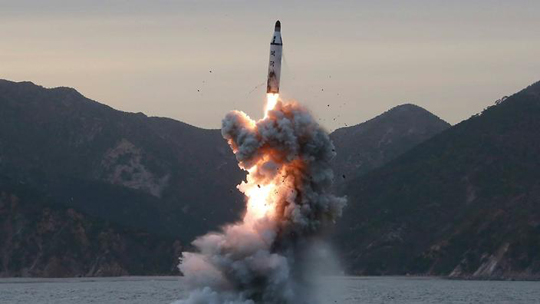Seoul, Mar 6: Nuclear-armed North Korea fired four ballistic missiles east of the peninsula today, with Japan saying three of them landed in its waters.

Pyongyang fired a ballistic missile last month -- its first such launch since October -- which Seoul said was aimed at testing the response from the new US administration of President Donald Trump.
Seoul said several missiles were filed into the East Sea, also known as the Sea of Japan, and that South Korea and the US were "closely analysing" tracking data for further details.
"In terms of the range, it is around 1,000 kilometres," the South's defence ministry said in a statement.
Seoul said its armed forces were "closely monitoring the North's military for further provocations and maintaining military readiness".
Japanese Prime Minister Shinzo Abe said North Korea fired four missiles "almost simultaneously", three of which landed in Japan's Exclusive Economic Zone.
In response to the launch, South Korea's acting president Hwang Kyo-Ahn convened an emergency National Security Council (NSC) meeting, the presidential office said in a statement.
Seoul and Washington launched annual joint military exercises last week that infuriate Pyongyang, which condemns them as provocative rehearsals for invasion.
A day after the Foal Eagle drills kicked off, the North's military warned of "merciless nuclear counter-action" against enemy forces.
"Now that the US imperialists and the South Korean puppet forces again kicked off the dangerous nuclear war drills against the DPRK at its doorstep, our army will counter them with the toughest counteractions," a spokesman said in a statement carried by the KCNA news agency.
North Korea has regularly carried out actions in protest against the exercises, last year firing seven ballistic missiles during them.
That rocket -- said by the North to use solid fuel and to be capable of carrying a nuclear warhead -- flew east for about 500 kilometres before falling into the Sea of Japan, South Korea said at the time.
North Korea is under heavy international sanctions for its nuclear and missile programmes.
Last month, China -- the North's chief ally and diplomatic protector -- announced a suspension of all coal imports from the North until the end of the year, depriving Pyongyang of a crucial source of foreign currency.
China's foreign ministry said Beijing and Pyongyang were still "friendly neighbours" but added it remained opposed to the North's nuclear ambitions.
North Korea is barred under UN resolutions from any use of ballistic missile technology. But six sets of UN sanctions since Pyongyang's first nuclear test in 2006 have failed to halt its drive for what it insists are defensive weapons.
Last year the country conducted two nuclear tests and numerous missile launches in its quest to develop a nuclear weapons system capable of hitting the continental US.
Pyongyang has also been blamed by Seoul for the killing of Kim's half-brother Kim Jong-Nam by two women using VX nerve agent at Kuala Lumpur's international airport last month.







Comments
Add new comment